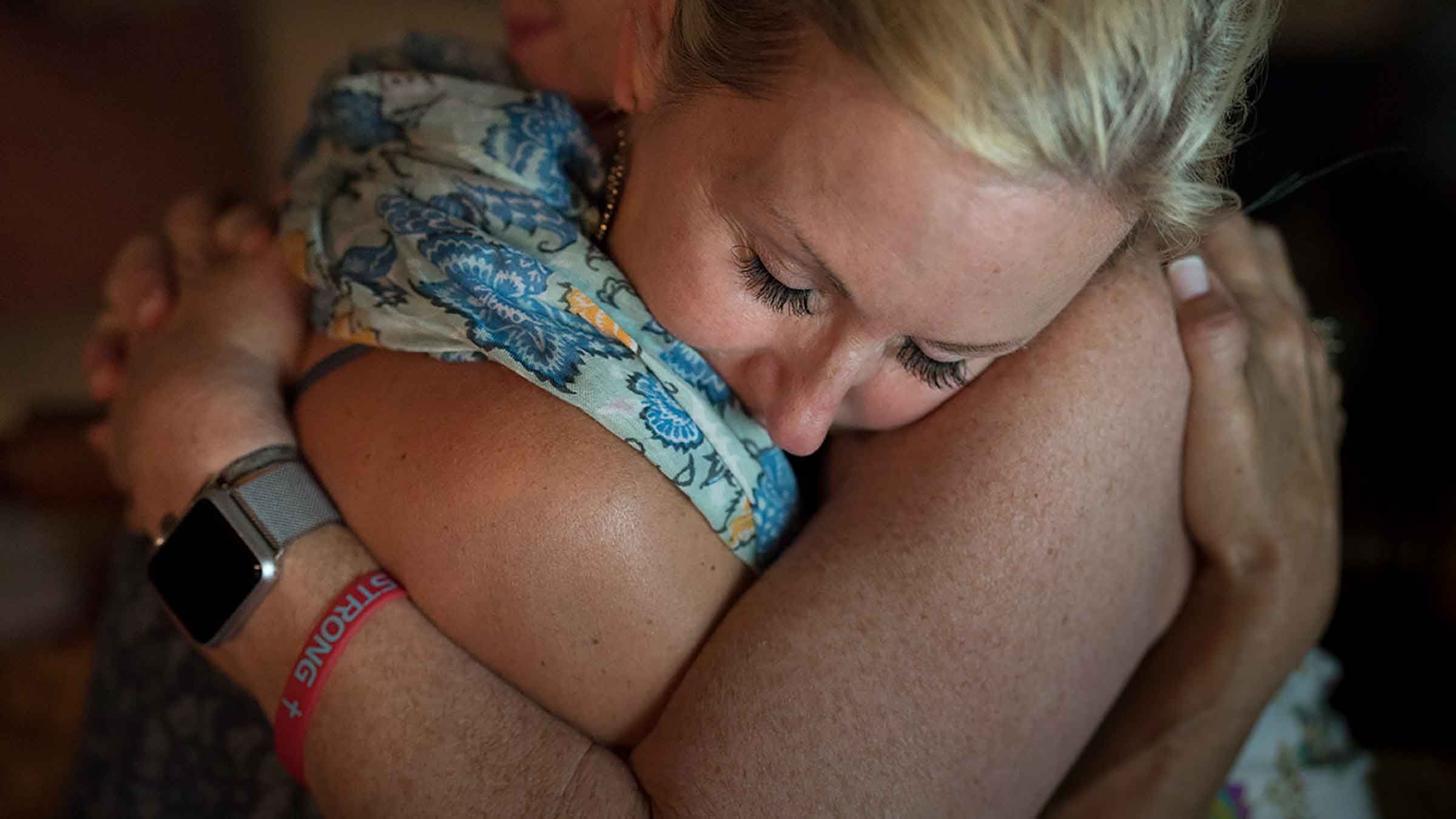Remembering a Loved One: Words of Comfort on Death Anniversaries

CaringBridge Staff | 01.12.24
Losing a loved one is a profound and deeply personal experience, and the pain of that loss doesn’t simply vanish as time passes. Each year, the anniversary of a loved one’s death can bring a flood of memories and emotions.
This day can reopen wounds and stir a profound sense of sadness for those who are grieving. If you know someone facing such a day, you might feel an urge to offer comfort but find yourself hesitating, unsure of the right words to say.
This article aims to guide you through finding words of comfort on the anniversary of someone’s death that are sensitive, sincere and supportive – it’s designed to help you to be there for someone on an anniversary that often brings both sorrow and remembrance.
What Is a Death Anniversary?
A death anniversary marks the date of someone’s passing, and it can be a difficult time for those who were close to the deceased. It’s often not just about acknowledging the calendar; it’s about remembering a life and the impact that the person had.
This anniversary can bring a mix of emotions—sadness, nostalgia, loneliness, anger, love and even guilt or regret. It’s a day that might bring people back to the intensity of their initial grief, regardless of whether it’s the first anniversary or the thirtieth.
For many, a death anniversary is a time for reflection and remembrance. Oftentimes, the time leading up to (and following) the date brings complicated feelings too. Honoring a loved one can involve visiting gravesites, participating in religious ceremonies or simply spending the day in contemplation.
Is it Important to Acknowledge Death Anniversaries?
Grief is a highly individual experience, so it is vital to assess your unique situation to determine whether it is appropriate to say something.
In general, recognizing the anniversary of a loved one’s death can hold profound importance for those in mourning. It’s more than a mark of passing time; it’s an acknowledgment of a life that was cherished and a loss deeply felt.
However, it’s natural to worry about saying the wrong thing or intruding on a person’s private grief. In these moments, it’s important to remember that your intention to provide comfort is itself a compassionate gesture. Even the simplest expressions of empathy can mean the world to someone who’s grieving.
Again, it’s important to acknowledge that everyone processes grief differently, and what comforts one person might not comfort another. Recognizing the individuality of grief is key to understanding how best to support someone during this time.
Related: 7 Ways to Console Someone Going Through a Hard Time
Words of Comfort on the Anniversary of Death

Grief does not adhere to a timeline. When you recognize a death anniversary, you acknowledge that the bereaved person’s feelings of loss are real, valid and understandable.
This validation is essential in helping them feel seen and supported in their continuing journey of grief. Here are some words you can share to someone who is mourning.
“I’m so sorry for your loss.”
This simple, direct statement can be one of the most comforting things to hear. It acknowledges their loss and shows that you’re empathetic to their pain. This expression of sympathy can be particularly meaningful on an anniversary, as it recognizes that the hurt is not forgotten.
“I’m thinking of you.”
Letting someone know they’re in your thoughts is a gentle way of offering support. It conveys that you’re there for them without pressuring them to open up or engage more than they’re comfortable with.
“How are you feeling?”
This open-ended question gives the bereaved the opportunity to share their feelings if they choose to. It shows that you’re willing to listen and are interested in their emotional well-being on this significant day.
“Do you have time to talk today?”
Reaching out to connect shows that you’re willing to offer your time and attention. Whether it’s a phone call or a face-to-face meeting, this invitation can provide them with an opportunity to express their feelings and share memories.
“Are you available to grab coffee soon?”
Inviting them to engage in a casual activity offers a sense of normalcy and a break from their grief. It’s a way of saying you’re there for them, not just in moments of sadness but also in more everyday settings.
Instead of waiting for the person to reach out, consider setting a date and time to meet. For example, simply saying, “Are you free for coffee next Wednesday at 10 a.m.” makes it easier for the person to respond.
This gesture can extend to any activity they might find comforting, whether it’s going for a walk, having lunch together or simply sitting together in silence.
“How can I honor [their loved one’s name] today?”
Asking how you can help remember their loved one shows a deep level of respect and consideration. It acknowledges that the person they lost is still an important part of their life and that their memory continues to be honored.
“I found this quote that really speaks to me…”
Sharing a thoughtful quote can be a way to offer comfort through words. When selecting a quote, consider its relevance and sensitivity to the situation. Note that it’s important to choose words that respect the bereaved person’s beliefs and feelings.
Related: 22 Inspirational Quotes About Hope and Healing
Other Ways to Honor a Death Anniversary
Sometimes, it may feel best to honor a death anniversary with actions in addition to (or instead of) using specific phrases. Here are some options to consider:
Offer to support them with specific asks
Practical support can be extremely helpful on a death anniversary. Offering to assist with daily tasks can ease their burden and show that you’re there to support them in tangible ways amidst their grief.
Suggest specific tasks like helping with grocery shopping, doing household chores or taking care of pets. Using tools like CaringBridge can facilitate the organization of such support, allowing a community of friends and family to coordinate and provide help effectively.
Share a fond memory of their loved one
Sharing a positive memory you have of their loved one can be a powerful way to honor their memory. It reminds the bereaved that their loved one’s life had a meaningful impact and that their presence is still felt and remembered by others.
Share how their loved one impacted or inspired you
If their loved one had a significant impact on your life, sharing this can be deeply comforting. It’s a way of acknowledging that the person they’re mourning left a lasting legacy that continues to inspire and influence others.
Send a handwritten card or flowers

In the digital age of texts and emails, receiving a handwritten card feels thoughtful. Putting the suggested words of comfort into a card and mailing it to the bereaved adds a special touch.
Sending flowers to the person’s home is a thoughtful, tangible way of showing you remember their loved one.
Make a meaningful donation
Find an organization that is relevant to the deceased loved one’s journey. For example, if they loved horseback riding, donate to an equestrian rescue center. The dollar amount is not important. Rather, the personalized donation will show the family you remember their loved one.
Be there for them
Sometimes, the best thing you can do is simply be there. Your presence—whether physically or through a message or call—can provide a sense of comfort and stability. Let them know you’re available and willing to offer whatever support they might need, even if they only want an ear to listen or a shoulder to cry on.
What Not to Say on a Death Anniversary
When comforting someone on the anniversary of a loved one’s death, it’s crucial to be mindful of the words we choose. Certain phrases, even when well-intentioned, can inadvertently cause more pain.
Phrases like “they’re in a better place now” or “time heals all wounds” are often meant to offer comfort. However, they can come across as dismissive of the person’s current pain and grief. These clichés can minimize the depth of their loss and the significance of their mourning.
Avoid comparing their loss with another’s or with one of your own experiences. Saying things like “I know how you feel, I lost my…” can detract from the uniqueness of their grief and might make them feel that their personal experience is being overshadowed.
Remember to stay mindful when making religious or spiritual statements if you’re not certain of the bereaved person’s beliefs. Statements like “they’re watching over you now” or “you’ll see them again in heaven” can be comforting to some, but for others, they may not align with their personal beliefs or philosophies.
What Would You Share?
Navigating the complexities of grief and loss is a deeply personal journey; it’s one that’s as unique as the individual experiencing it. On the anniversary of a loved one’s death, the need for comfort and understanding becomes prominent.
If you’ve been in a position where you’ve had to comfort someone on such an occasion, or if you’ve been on the receiving end of such comfort, your experiences and insights could be invaluable to others.
We encourage you to share these personal stories. Through sharing, you can provide others with ideas and inspiration on how to approach such delicate situations with empathy and care.